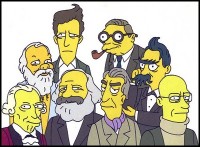PACTISS recommends

Where science meets art. The only necessary and sufficient book store in Melbourne.
Hope our friends enjoy the new look and feel – now optimised for mobile devices for access on the go.

PEOPLE
-
Coordinator: Peter Ellerton
Web guy: Jason Etheridge RESOURCE COLLECTIONS
NEW RESOURCES
-
- A nice Philosophy of Mind summary
- The power of categorical logic
- What exactly is the scientific method and why do so many people get it wrong?
- Paralympic athletes faster than olympic athletes — what does this tell us about difference?
- Logic: if + then = why? How can we understand the power of logic?
- How do we ensure we are exposed to new ideas? A parody with bite.
- A Life of Meaning (Reason Not Required) – What is the nature of our relationship with reason?
- Can you name this cognitive bias?
- By what measures can we value human life?
- Teaching philosophy improves standardised scores
- Are we in control of our own decisions?
- Neuroscience and education: myths and messages
- Free will is not as free as we think – and that’s ok.
- Where’s the Proof in Pseudoscience?
- Science in the lead?
RANDOM POSTS
-
- Making ethical investment decisions
- Did aversion to bitter tastes evolve into moral disgust?
- 10 Philosophical Principles
- Evolution and the Second Law of Thermodynamics
- Failing the Turing Test
- Philosophy Graduate Abilities
- Should we seek a perfect world?
- Philosophy of Religion - Cosmological Argument
- Ethical Dilemmas in Science
- Pick your Cognitive Bias
USEFUL RSS FEEDS
 Philosopher’s Zone
Philosopher’s Zone NYTimes – The Stone
NYTimes – The Stone Philosophy Now
Philosophy Now RSA Animate
RSA Animate- The Green Corridors Initiative
- Governance governing government
- Why print money when we can print wealth?
- Building a resilient health and care system
- We'll always have Paris?
- Experimentation and equity in global cities
- Technology-enabled deliberative democracy
- Healthier placemaking
- Creating a sovereign wealth fund in Wolverhampton
- Economic recovery and climate action
 Scientific American – Mind and Brain
Scientific American – Mind and Brain- Asexuality Research Has Reached New Heights. What Are We Learning?
- Political Ads Can Target Your Personality. Here's What Could Go Wrong
- Why Writing by Hand Is Better for Memory and Learning
- People with Myalgic Encephalomyelitis/Chronic Fatigue Syndrome May Have an "Exhausted" Immune System
- How to Close the 'Orgasm Gap' for Heterosexual Couples
- Virtual Bar Scenes Are a New Tool to Study Why People Commit Crimes in the Heat of the Moment
- Anger Can Help You Meet Your Goals
- How Sleep Engineering Could Help Heal the Brain
- Dominatrices Are Showing People How to Have Rough Sex Safely
- Farmers in Crisis, Long Overlooked, Are Finally Getting Mental Health Support
 TED talks
TED talks- War journalism should be rooted in empathy — not violence | Bel Trew
- The problem with food and climate — and how to fix it | Jonathan Foley
- How buildings can improve life — inside and out | Doris Sung
- The satellite helping slow climate change — right now | Millie Chu Baird
- What's possible when the arts belong to everybody | Lear deBessonet with Brian Stokes Mitchell
- “Cant de la Sibil·la” / "Quien Más Me Ama" | Maria Arnal
- Bravery, brilliance and RuPaul Charles | On the Spot | RuPaul Charles
- How to claim your leadership power | Michael Timms
- Why young people are worse off than their parents — and what to do about it | Scott Galloway
- Quantum computers aren't what you think — they're cooler | Hartmut Neven
THEMED RESOURCES
- July 2024MonTueWedThuFriSatSun123456789101112131415161718192021222324252627282930311234
Author Archives: Peter Ellerton
The Tale of the Slave
Robert Nozick’s dangerous question.
Posted in Media Articles, Cartoons, Social and Political Philosophy
Comments Off on The Tale of the Slave
10 Philosophical Principles
From John Stuart Mill’s On Liberty, Aristotle’s ‘mean’ philosophy to the principle of charity, here are the greatest principles of philosophy By JULIAN BAGGINI, Editor of The Philosopher’s Magazine 1. THE HARM PRINCIPLE by JOHN STUART MILL, 1806-1873 Whenever legislation is … Continue reading
Posted in Media Articles, Cartoons
Comments Off on 10 Philosophical Principles
The Fallacy of Deepest Offence
Are all ideas equal? Not in the classroom By Peter Ellerton, University of Queensland There is a widespread belief amongst teachers that it is part of their duty of care, even a defining aspect of their professionalism, that all views … Continue reading
Posted in Critical Thinking, Media Articles, Cartoons
Comments Off on The Fallacy of Deepest Offence
Philosophy Graduate Abilities
Data on the performance of Philosophy graduates. Click to enlarge. More info here. Note that the philosophy students perform outstandingly well in verbal and writing skills and are the best of the non-quatitative areas in quantitative reasoning.
Posted in Critical Thinking
Comments Off on Philosophy Graduate Abilities
Fallacies Poster
A lovely job from http://yourlogicalfallacyis.com/ please visit the site for interactive presentation.
Posted in Booklets, Handouts and Worksheets, Critical Thinking
Comments Off on Fallacies Poster
What Truth Doesn’t Mean
The truth, the whole truth and … wait, how many truths are there? Calling something a “scientific truth” is a double-edged sword. On the one hand it carries a kind of epistemic (how we know) credibility, a quality assurance that a … Continue reading
Posted in Media Articles, Cartoons
Comments Off on What Truth Doesn’t Mean
Can science answer questions about morality?
Sam Harris on TED
Posted in Ethics and Moral Philosophy, Media Articles, Cartoons, PowerPoints, Video and other Media
Comments Off on Can science answer questions about morality?
The Language of Science
Listen and learn: the language of science and scepticism Peter Ellerton Making sure what’s intended is what’s heard can be more difficult than it seems. Melvin Gaal (mindsharing.eu) As scientists, one of our responsibilities should be to promote clarity. A lot … Continue reading
Posted in Booklets, Handouts and Worksheets, Critical Thinking, Media Articles, Cartoons, Philosophy of Science
Comments Off on The Language of Science
Analysis of Critical Thinking in Climate Science
No one likes to change their mind, not even on climate People put up all kinds of psychological barriers to changing their minds. Thomas Galvez Last night’s ABC documentary I Can Change Your Mind About Climate was about two people — … Continue reading
Posted in Critical Thinking, Media Articles, Cartoons
Comments Off on Analysis of Critical Thinking in Climate Science
Post hoc ergo propter hoc or False Cause – Correlation does not imply causation
Another legend from Dilbert.
Posted in Critical Thinking, Media Articles, Cartoons
Comments Off on Post hoc ergo propter hoc or False Cause – Correlation does not imply causation
Philosophy — What’s the Use?
Are you looking to see why teaching philosophy is important? Another great article from NYTimes The Stone Almost every article that appears in The Stone provokes some comments from readers challenging the very idea that philosophy has anything relevant to … Continue reading
Posted in Booklets, Handouts and Worksheets, Critical Thinking
Comments Off on Philosophy — What’s the Use?
What Democracy is not…
Discuss.
The Fallacy of ‘Deepest Offence’
The Fallacy of ‘Deepest Offence’ By Peter Ellerton image via here Nothing is so central to a liberal society as the right to discuss ideas. Not being able to do this at all is totalitarianism – the banning of discussing, … Continue reading
Posted in Essay, Social and Political Philosophy
Tagged Fallacy, offence, offended
Comments Off on The Fallacy of ‘Deepest Offence’
Another Double Blind Test surprise
Stradivarius Fails Sound Test Versus Newbie Violins Download pdf (from sciam) Can you tell the difference between modern violins and antiques crafted by Italian masters? Don’t feel too bad – expert players can’t do it either. In a double-blind test, 21 experienced … Continue reading
Posted in Booklets, Handouts and Worksheets, Critical Thinking, Media Articles, Cartoons, Philosophy of Science
Comments Off on Another Double Blind Test surprise
When Should Science be Censored?
Calls to censor details of potential killer flu via ABC News The suppression of breakthrough research into deadly bird flu strains has been labelled scientific censorship by some, but others say it is a necessary step to prevent a possible … Continue reading
Posted in Booklets, Handouts and Worksheets, Ethics and Moral Philosophy, Media Articles, Cartoons, Social and Political Philosophy
Comments Off on When Should Science be Censored?
Correlation Does Not Imply Causation
Another classic from Dilbert See also Post Hoc Ergo Propter Hoc
Posted in Critical Thinking, Media Articles, Cartoons
Comments Off on Correlation Does Not Imply Causation
Philosophical Zombies
From the concept by Chalmers. Could humans exist that are not conscious? The extract below is from his site. Philosophical zombies It is philosophical zombies that I’m most interested in here, since I’m a philosopher and they raise very interesting … Continue reading
Posted in Media Articles, Cartoons, Original Philosophical Texts, Philosophy of Mind - Consciousness
Comments Off on Philosophical Zombies
The Coherentist’s Nightmare
The coherency theory of truth
Posted in Critical Thinking, Media Articles, Cartoons, Philosophy of Language
Comments Off on The Coherentist’s Nightmare
Harvard Justice Series: The Moral Side of Murder
Part One:
Posted in Ethics and Moral Philosophy, PowerPoints, Video and other Media
Comments Off on Harvard Justice Series: The Moral Side of Murder
